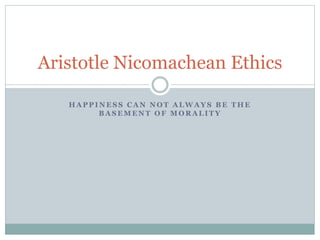Aristotle and nicomachean ethics
- 1. H A P P I N E S S C A N N O T A L W A Y S B E T H E B A S E M E N T O F M O R A L I T Y Aristotle Nicomachean Ethics
- 2. 4 things to live well 1. ŌĆó Health: The physical perfection 2. ŌĆó Wealth: The economic ability 3. ŌĆó Friendship: The need of affiliation 4. ŌĆó Virtue: The Ethics followed by one self
- 3. Eudaimonia: A happy Life ’ü▒ A life that is successful ’ü▒ Want for those we love ’ü▒ Highest state of Eudaimonia: Having money, reasonable look and good ancestry
- 4. The Function of Human Being ’āś Every human being is characterized with a Function ’āś Ergon of human being= Rational Activity ’āś Good human being: excels in this characteristic activity ’āś Human beings flourish when the rational virtues are being activated
- 5. Virtue ŌĆó Virtue that can not be learned ŌĆó Virtue that only can be achieved by both Nature and Nurture ŌĆó Virtue that can be learned ŌĆó Virtue that can be developed through knowledge
- 6. The Golden Mean ’üČ A virtue lies between two vices ’üČ Virtue= Middle of two extreme action ’üČ Common Misinterpretation: Counsel of Moderation ’üČ A good thing (For example ŌĆ£HonestyŌĆØ) is always good ’üČ A bad thing (For example, ŌĆ£StealingŌĆØ) is always bad





